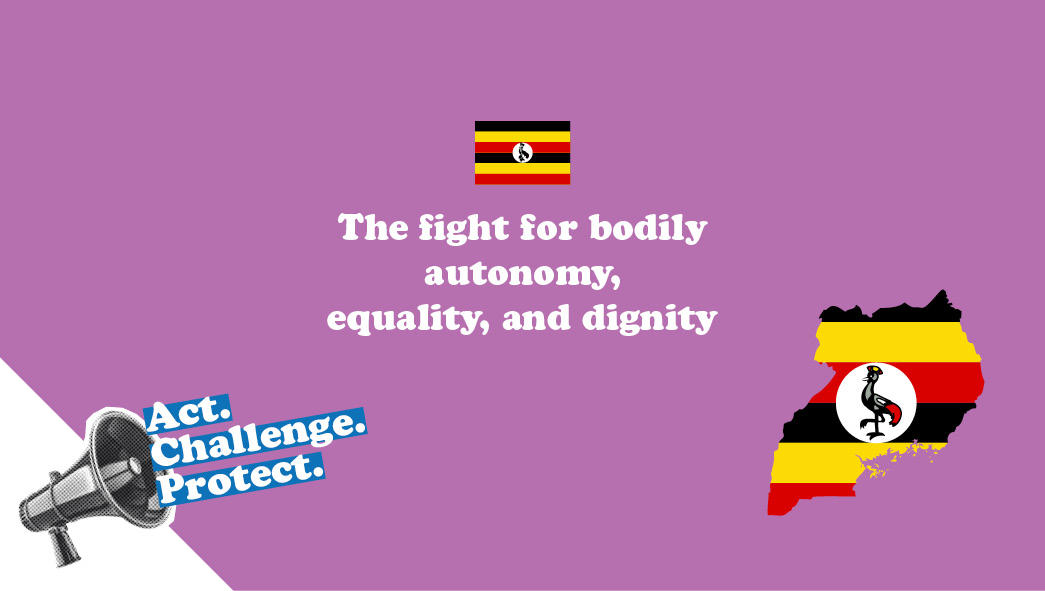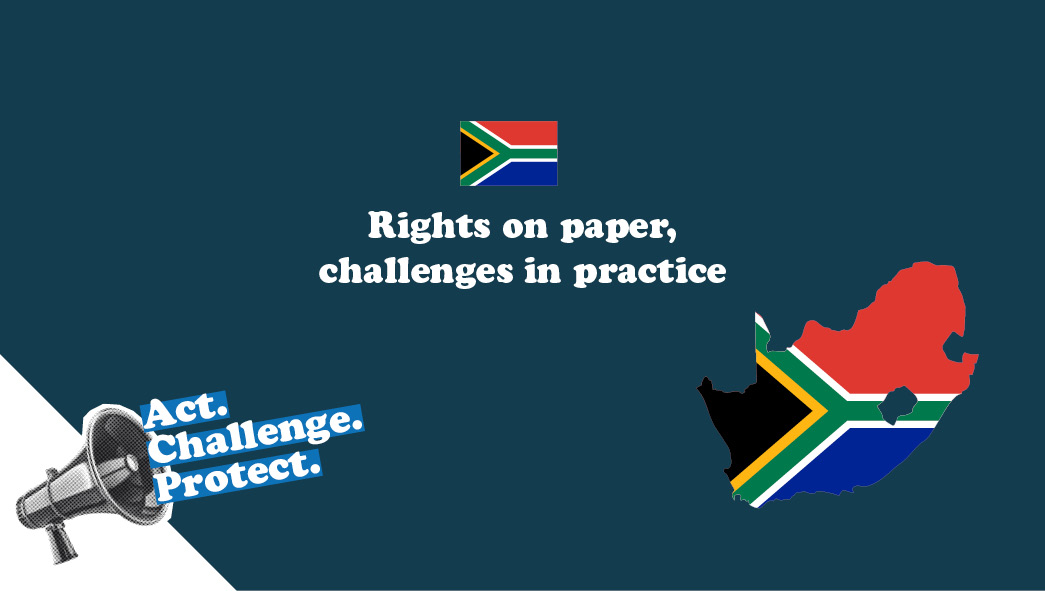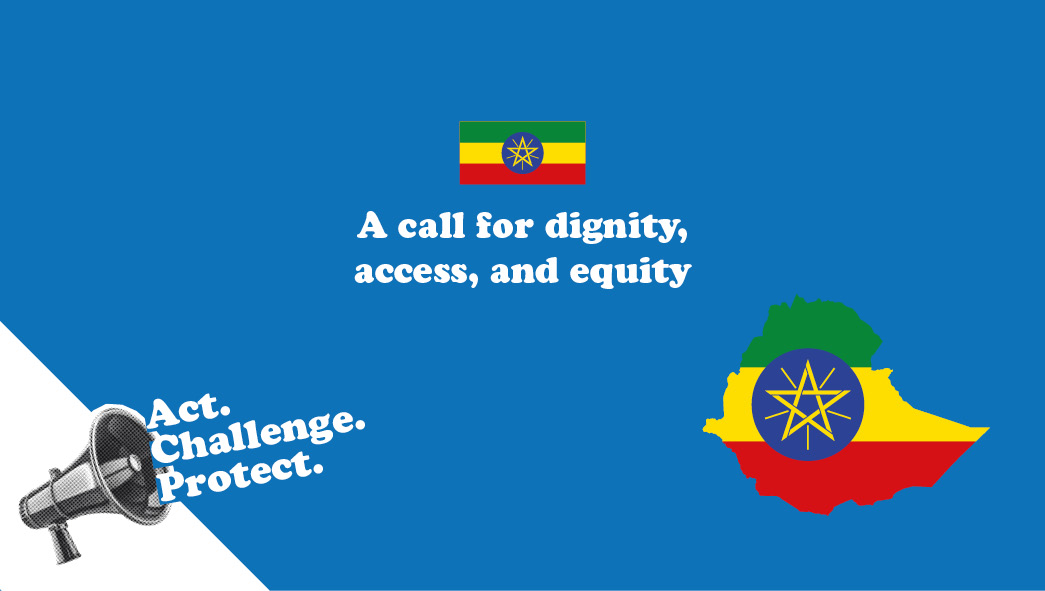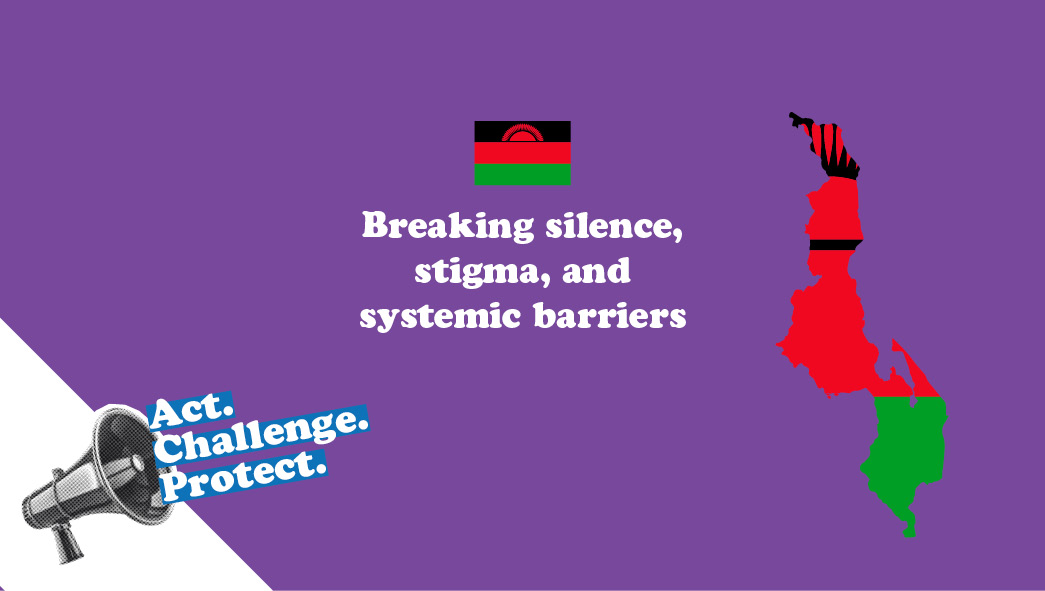SRHR in Uganda
The fight for bodily autonomy, equality, and dignity
In Uganda, many people still don’t have the freedom to make choices about their own bodies. Strict abortion laws, high teenage pregnancy rates, and violence against LGBTQI+ people make access to sexual and reproductive health and rights (SRHR) unfair and unequal.
“According to the Democratic and Health Surveys 2016, 25% of teenage girls are either pregnant or have already had their first child. Of the 28% of girls who were sexually active while still at school, 80.1% became pregnant. Of this, 97% dropped out of school because of the pregnancy. By age 15, only 32% of young women and 38% of young men aged 15-24 had never had intercourse.” (Source)
The #ActForSRHR campaign calls on communities, leaders, and decision-makers in Uganda to Act. Challenge. Protect.
Because SRHR is not a privilege — it’s a right.
Top 6 SRHR Challenges in Uganda
- 17.2% of maternal deaths are among adolescent girls aged 15–19. Adolescent pregnancies significantly contribute to maternal deaths in Uganda. According to the World Health Organization (WHO), approximately 20% of maternal deaths in Uganda occur among girls aged 15–19. (Source)
- In Uganda, 1 in 4 teenage girls (25%) becomes pregnant by age 19, and nearly half are married before they turn 18. (Source)
- Same-sex relationships are illegal, with harsh punishments under the 2023 Anti-Homosexuality Act. (Source)
- There are approximately 314,000 unsafe abortions in Uganda each year with at least 90,000 of them leading to severe health complications. Each year 1 500 girls and women die in Uganda from unsafe abortions, contributing approximately 26% of all maternal deaths in the country. These could be prevented with adequate and accessible emergency obstetric care to manage complications and by counselling women and girls on prevention and the dangers of induced abortion. (Source)
- The government spends $14 Million each year treating unsafe abortion complications. (Source)
- The estimated prevalence of Female Genital Mutilation (FGM) in women aged 15-49 is 0.3% in Uganda. (Source)
Sexual Health
The right to safe, respectful, and pleasurable sexual experiences.
Adolescents, unmarried women, and LGBTQI+ people are often excluded from safe and respectful sexual health care.
What’s needed:
- Free and confidential HIV and STI testing for all young people
- Comprehensive sexuality education in all schools
- Health workers trained to treat everyone with dignity, and without judgement
Reproductive Health
Access to contraception, maternal care, safe abortion, and fertility support.
Contraceptives are hard to access — especially for young, rural, or unmarried people. Abortion is mostly illegal, which puts lives at risk.
Did you know?
- Abortion complications cause 26% of maternal deaths (Source)
- Uganda has one of the highest adolescent birth rates in East Africa. Over 32 000 teenage pregnancies recorded per month. (Source)
What’s needed for better SRHR in Uganda:
- Free contraception available for all, no matter your socioeconomic status.
- Safe post-abortion care at all clinics
- Emergency services that care for, not punish, those seeking help
Sexual Rights
The right to express one’s sexuality and gender identity without fear.
LGBTQI+ people face legal discrimination, violence, and fear. Survivors of sexual violence often do not get the help they need.
What’s needed:
- Repeal laws like the 2023 Anti-Homosexuality Act
- GBV support services that centre survivors’ needs
- Campaigns to promote respect, consent, and inclusion
Reproductive Rights
The freedom to decide if, when, and how to have children.
Girls and women are often pushed into motherhood too early. Many cannot access the services they need to make informed choices. Early marriages put girls and adolescents at risk of early or teenage pregnancies, often leading to serious consequences for their health, education, and overall well-being.
What’s needed:
- Stronger protection against forced, early, and child marriages
- Legal change to allow safe, legal abortion in more cases
- Health services for those most at risk, especially in rural areas
Enabling Environment
Systems and structures that support SRHR for all.
Laws and clinics should support rights, but in many places they don’t. The system must change to meet people’s needs.
Access to age-appropriate SRHR, including Comprehensive Sexuality Education (CSE) information and awareness is required.
What’s needed:
- More money for youth-friendly and community-based care
- Laws that match international human rights standards
- Local leaders who speak up for equality and access

Myths and misinformation in Uganda
Myth: “Contraceptives cause infertility.”
Fact: False. Modern contraceptives are safe and reversible.
Myth: “Only sex workers or ‘bad girls’ use condoms.”
Fact: Wrong. Everyone has the right to protect their health.
Myth: “Homosexuality is un-African.”
Fact: False. LGBTQI+ people have always existed in African cultures.
Myth: “Sexuality Education (CSE) promotes early sexual debut”
Fact: False. Comprehensive Sexuality Education helps young people delay sexual activity, make informed choices, and develop respectful, healthy relationships. It promotes consent, confidence, and critical thinking — not promiscuity. (Source)
Voices from Uganda
“I was stigmatized by the administration of the school… they kept on talking wrong about me within the community.”
— Auma Angella, expelled from school at 14 after a forced pregnancy test (Source)
“I wish I had known earlier that this is not a curse.”
— Miriam’s grandmother, after learning about intellectual disabilities and SRHR (Source)
“Having access to sexual reproductive health services decreases child marriage, unintended pregnancies and prevents transmission of sexually transmitted infections.”
— Kasfa Kahunde, Miss Tourism Tooro (Source)
How you can take action in Uganda
✅ Use #ActForSRHR to share your story and speak up
✅ Join a MenEngage member organisation in your area
✅ Ask your school, clinic, or MP — “What are you doing for SRHR?”




